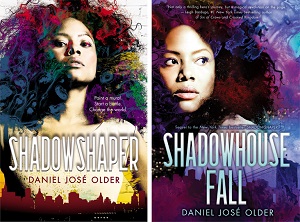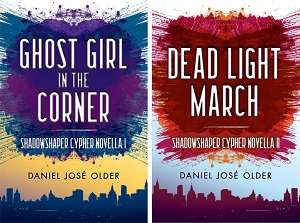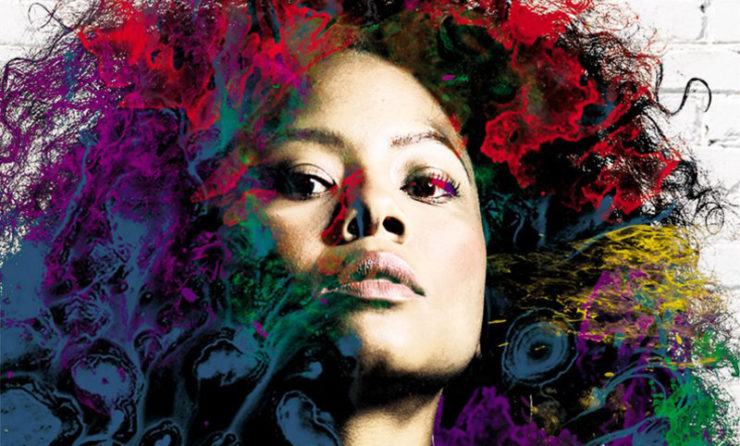Every librarian has those select few books they recommend to just about everyone. Books that hit a lot of marks and can appeal to a variety of people even as they tell very specific stories. Books that are well written with evocative layers, truthful and realistic depictions, and characters from diverse backgrounds. I am constantly handing people copies of G. Willow Wilson’s Ms. Marvel, Margot Lee Shetterly’s Hidden Figures, Benjamin Alire Sáenz’s Aristotle and Dante Discover the Secrets of the Universe, and Nnedi Okorafor’s Binti novella series. And inevitably they come back begging for more.
Of course, also high up on that pile of librarian-approved recommendations is Daniel José Older’s Shadowshaper series. If ever there was a Must Read about Brooklynite Latinx teenagers using magical graffiti to battle evil, this is it.
Shadowshaper kicks off with a frightening incident at a party one night where Sierra Santiago learns about Shadowshapers, magicians with the power to summon spirits into art. As Robbie, a Haitian American boy from school, pulls her deeper into the shadowshaping mythos, Sierra uncovers painful family secrets riddled with misogyny. Sierra and Robbie go on the hunt to find who out has been killing shadowshapers but things quickly spiral out of control. She makes enemies of the Sorrows, powerful beings from the House of Light in order to confront the dangerous enemy trying to do her harm, a choice that will haunt her in the sequel, Shadowhouse Fall.
 With her newfound power, Sierra becomes the leader of Shadowhouse and therefore the yin to the yang of the House of Light. As the Sorrows come after her, she turns her friends and family into a veritable magical army. As Sierra resists her destiny, the truth of her relationship with the Sorrows is revealed. Conflicts from the real world bleed into the magical, and vice versa, until Sierra is battling enemies from all fronts. She’ll need all the teamwork she can get if she wants to defeat the Sorrows.
With her newfound power, Sierra becomes the leader of Shadowhouse and therefore the yin to the yang of the House of Light. As the Sorrows come after her, she turns her friends and family into a veritable magical army. As Sierra resists her destiny, the truth of her relationship with the Sorrows is revealed. Conflicts from the real world bleed into the magical, and vice versa, until Sierra is battling enemies from all fronts. She’ll need all the teamwork she can get if she wants to defeat the Sorrows.
There are also two novellas starring set between books 1 and 2. In Ghost Girl in the Corner, girlfriends Izzy and Tee investigate the spirit of a young woman haunting Manny’s newspaper office. And in Dead Light March, Sierra struggles with being Lucera, her brother Juan writes a new song to impress his crush, and her classmate Mina learns more about the House of Light. Their stories intertwine at the West Indian Day Parade.
What strikes me the most about the Shadowshaper series is how unapologetic it is. Older pulls no punches. The microaggressions, harassments, and systemic oppression Sierra experiences aren’t there for dramatic tension. Every damn day marginalized people go through exactly the same (non-magical) stuff Sierra does. To exclude those experiences would be to disregard the truth of our lives, yet all too often that’s exactly what happens.
Through Sierra, Older calls out white supremacy, the New Jim Crow, misogyny and sexism, racism, and toxic masculinity. She confronts white feminism, performative versus active allyship, and what it’s like to be a young woman of color navigating a world dominated by older white men. Add in the experiences of Izzy and Tee, Pulpo’s mental health issues, and Juan’s growing understanding about how detrimental the patriarchy really is, and you have honest, realistic diversity.
For her whole life, those in power have made demands of Sierra. Her parents have the usual rules, but nearly everyone else—her school, the cops, even other members of her own family—have already decided what she’s worth. Before Shadowshaper, there wasn’t much she could do about that. Her aunt Rosa could make awful comments about Robbie’s dark skin, her grandfather could shut her out of her magical inheritance, the criminal justice system could take what it wanted without repercussions, and white men could try to break her. But now she can fight back. Sierra no longer has to choose between standing aside and living or standing up and probably getting killed. She has the power and the allies to take on those who would oppress her.
 The Shadowshaper series is my catharsis; Sierra’s triumphs are mine vicariously. I look at Sierra and think of my ancestors who suffered and died and resisted and fought back on plantations and against Jim Crow and during the Civil Rights Movement so I would not have to. Neither Sierra nor I are not entirely free, but the shackles are shattered. Sierra literally stands face to face against her oppressors and holds her ground, something I can only metaphorically do.
The Shadowshaper series is my catharsis; Sierra’s triumphs are mine vicariously. I look at Sierra and think of my ancestors who suffered and died and resisted and fought back on plantations and against Jim Crow and during the Civil Rights Movement so I would not have to. Neither Sierra nor I are not entirely free, but the shackles are shattered. Sierra literally stands face to face against her oppressors and holds her ground, something I can only metaphorically do.
Clearly, Older is a strong, creative writer. The Shadowshaper universe is vast and unique yet true to its characters. Yes, the series has the dreaded love triangle (doesn’t appear until the second novel), but this is one of the few times I didn’t mind it. It’s resolution neither invalidates her first romance or detracts from her second. When crafting said love triangle, Older remembered that Sierra and her beaus are actual teenagers still figuring out both how to feel and understand what they’re feeling. Sounds obvious, I know, but if you read a lot of YA you’ll know how rare that is.
If I had to pick something to whinge about I’d say the plot moves a little too quickly and that I’d like to have a bit more time to take in the scenes. But when the only con I can think of is “GIVE ME EVEN MOAR GOODNESS,” I ain’t stressing.
I liked Shadowshaper a whole heckuva lot, but I completely and utterly loved Shadowhouse Fall. Each addition to the Shadowshaper canon—novellas included—have been stronger than the last. Shadowhouse Fall is an A+ novel and I can’t frakking wait to read the third novel. Plus, that cliffhanger is going to haunt me until I get my grubby hands on the ARC next year. You’re killing me here, Older.
The Shadowshaper Cypher series—Shadowshaper, Shadowhouse Fall, and the novellas Ghost Girl in the Corner and Dead Light March—are available from Scholastic.
Alex Brown is a teen librarian, writer, geeknerdloserweirdo, and all-around pop culture obsessive who watches entirely too much TV. Keep up with her every move on Twitter and Instagram, or get lost in the rabbit warren of ships and fandoms on her Tumblr.











I love this series, as well as Older’s Bone Street Rumba series. Both feel vibrant and real (despite the haints, ghosts, etc.)
I’ve only read Bone Street Rumba, but (as a white person) I felt that those were works that really made me stretch and grow because of exactly what you’re mentioning here – Older really hits the notes of being a POC hard.
Definitely going to give these a try, thanks for the article!
In response to this article, I delighted a librarian by asking to reserve Aristotle and Dante Discover the Secrets of the Universe, although I suspect that may have been simply down to the title.